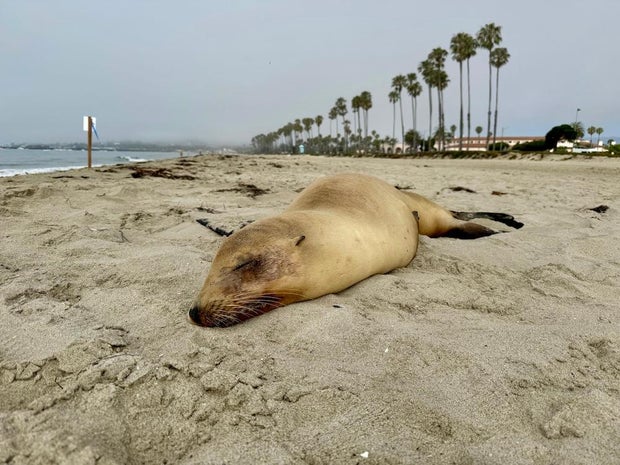Sea lions sick with domoic acid poisoning rescued from Ventura and Santa Barbara beaches
Nearly two dozen sea lions have been rescued from Ventura and Santa Barbara beaches this past week after they were sickened by domoic acid poisoning, according to the Channel Islands Marine & Wildlife Institute.
Sea lions experiencing symptoms such as seizures, disorientation, erratic behavior and involuntary muscle spams are washing up on the shores of beaches along the 155 miles of coastline within the two counties. Since last Friday, the nonprofit — whose staff research, rescue and rehabilitate marine life — said it has been receiving 100 reports a day about sick sea lions found on the more than 100 beaches across Ventura and Santa Barbara counties.
It's mostly adult female sea lions who have been suffering from domoic acid poisoning caused by a harmful algal bloom, the Marine & Wildlife Institute said.
Sometimes called "red tides," the blooms produce domoic acid — a neurotoxin that builds up in small fish such as sardines and anchovies, according to the Marine Mammal Center, a Northern California-based rescue and research group.
The fish consume a toxic microscopic algae called pseudo-nitzschia australis, which doesn't affect them but can sicken the dolphins, birds and sea lions that eat the tiny fish.
"Domoic acid attacks the brain and the heart causing seizures and heart failure," according to the center. "If left untreated, it usually causes permanent brain damage."
While the toxin can naturally flush out of the animal's system, it can leave sea lions with longer-lasting, more serious side effects if they are repeatedly exposed to it. Other health issues faced by the recently rescued sea lions include mouth foaming, head weaving, staring into space, lethargy and an inability to get out of the tidal zone.
The Marine & Wildlife Institute has provided a list of steps for people who come across sick and stranded sea mammals on the beach.
- Do not touch the animal. Specifically, do not pour water onto the animal or try feeding it. Also, do not push or drag it into the water or elsewhere. Sea lions may bite if they're touched or harassed, the nonprofit warns.
- Observe the animal. Take note of any physical characteristics or symptoms but keep a distance of at least 50 feet.
- Try to pinpoint the animal's exact location, taking note of any nearby landmarks or other indicators that can be reported to rescue groups.
- Call the Channel Islands Marine & Wildlife Institute hotline at 805-567-1505 to report sick or stranded animals found on Ventura and Santa Barbara beaches. If you're in Los Angeles County, you can call the toll-free hotline for the Marine Mammal Care Center at 800-39-WHALE (800-399-4253). Those in Orange County can reach the Pacific Marine Mammal Center at 949-494-3050.




